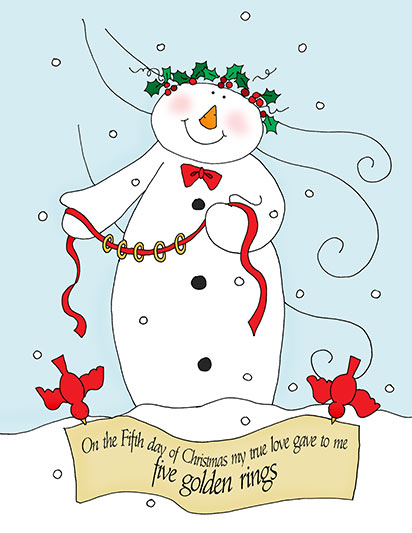On the Fifth Day... hoping for gold rings?

Mon, 07 Dec 2015 15:53:00 GMT
On the fifth day of Christmas you may be hoping for five gold rings, or a necklace, or even earrings. The bible tells us that gold was one of the gifts given to Jesus on his birth and this precious metal is still a favoured gift to show our love. However, before you include gold on your Christmas list you might want to think a little bit about its origins and the journey it has made before gracing your, or you true love’s body.
Gold mining is one of the worst forms of mining in terms of the pollution it generates. It pollutes rivers and water courses with sulphuric acid and creates huge amounts of toxic waste. For every 0.333 ounce gold ring, as much as 20 tonnes of toxic waste is generated. This is a grey sludge-like liquid that contains cyanide, mercury and other heavy metals. In some areas of the world this is dumped into the sea. For example, mining companies in Papua New Guinea use the Pacific Ocean as a waste stream for 5 million tons of toxic waste each year, harming corals and other sea life. In other countries, including Romania, China, Russia and South Africa, waste is contained in dams or pits. Unfortunately these aren’t always watertight and water and soil contamination are common hazards. Even worse, these dams have a habit of failing, for example, in 2014 a British Columbian gold and copper mine dam spilled 25 million cubic metres of toxic waste into local rivers and lakes poisoning fish and other wild life and devastating the local tourism industry.
For over a hundred years the Witwatersrand Basin has been the hub of gold mining in South Africa. 40,000 tonnes of gold has been excavated leaving a local landscape pitted with holes, waste dumps, dams and toxic lakes. It has never been an ideal home location, but many poor people have no choice but to live cheek by jowl with some of the most contaminated land in the world. And now things are getting even worse – increasing levels of rainfall, caused by climate change, is de-stabalizing an already volatile environment. Mines are being flooded more regularly and there is now permanent contamination of water courses and rivers. Residents are suffering as a result of daily exposure to high concentrations of carcinogens including cobalt, zinc, arsenic, and cadmium. Children play daily on contaminated soil.
The environmental consequences of gold mining have been recognised and have resulted in initiatives like Fairmined Ecological Gold, which is mined without the use of chemicals. Gold can also be Fairtrade certified, which supports smaller producers who use minimal amounts of chemicals. Other initiatives such as the No Dirty Gold campaign, supported by Oxfam, and the Responsible Jewellery Council, aim to push for a sustainable gold supply chain, but there are many who believe that achieving this is going to be very tricky.
(http://newint.org/features/2014/09/01/myth-ethical-gold/).
So, back to our Christmas list, perhaps we don’t need that gold? As Henry David Thoreau wrote in Life without Principle, ‘ I did not know that mankind were suffering for want of gold. I have seen a little of it. I know that it is very malleable, but not so malleable as wit. A grain of gold will gild a great surface, but not so much as a grain of wisdom.”
The Chinese have a proverb – “A book holds a house of gold” – while we might not be able to wear a book on out finger, we can wear them in our hearts.







